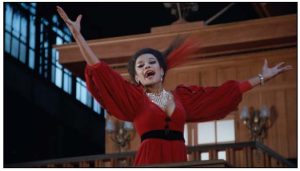 The great French-Mauritian director Med Hondo’s spectacular cinematic odyssey “West Indies: The Fugitive Slaves Of Liberty” (1979) will run at Film Forum in a new 4K restoration from Friday, March 22 through Thursday, March 28.
The great French-Mauritian director Med Hondo’s spectacular cinematic odyssey “West Indies: The Fugitive Slaves Of Liberty” (1979) will run at Film Forum in a new 4K restoration from Friday, March 22 through Thursday, March 28.
Adapted from Daniel Boukman’s Les Négriers (The Slavers), a play which Hondo directed in Paris in the early 70s, WEST INDIES: THE FUGITIVE SLAVES OF LIBERTY tells the story of French imperialism as a musical extravaganza.
Aboard an enormous hand built wooden slave ship acting as a multipurpose set, the film traverses the West Indies, Europe, and the Middle Passage, spanning over 400 years. Dynamic, intricately choreographed reenactments depict the effects of official French policy upon the colonized, the enslaved, and their descendants. Surveying the actions and motivations of the resigned, the revolutionary, and the powers that be (along with their lackeys), WEST INDIES is a call to arms for a spectacular yet critical cinematic reimagining of an entire people’s history of resistance and struggle.
At $1.3 million, it was the biggest-budget African production ever, as well as the continent’s first musical. Hondo, who wished “to free the very concept of musical comedy from its American trade mark” remained resolute in his vision, refusing to alter the script and rejecting funding offers from Warner Brothers and MGM when they asked for changes. Mixed critical reception in France barred the film from wider release with it gradually slipping out of circulation.
Mohamed Abid Medoun Hondo (1936 – 2019) was born into the Haratin community in Mauritania and later moved to Marseille, France to pursue drama studies. He began his career with a role as an extra in Godard’s MASCULIN FÉMININ (1966), and appeared in Costa-Gavras’s UN HOMME DE TROP (1967), John Huston’s A WALK WITH LOVE AND DEATH (1969), among other films. He worked as a voice actor for decades, dubbing the voices of Black actors in French versions of American films (such as Morgan Freeman and Eddie Murphy later in his career). With the money earned dubbing, he financed his experimental feature debut and most well-known work, SOLEIL Ô, a resistance story and attack on capitalism set in Paris, which premiered at Cannes Critics’ Week in 1970 to acclaim.
Hondo’s filmography explores conflicts within the African diaspora between competing European powers, and mounted urgent examinations of colonial history, racism, capitalism and their consequences.
“Med Hondo’s cinema is a cinema concerned with making us think as much as making us feel,” says Aboubakar Sanogo, writer, film studies professor, and Hondo scholar. “It is a cinema that is less concerned with Oscars than with the possibility for film to actually play a major role in the production of new subjectivities, new ways of feeling, new ways of distributing power across the world, and indeed new ways of imagining and experiencing the world.”
Anthology Film Archives will host a Med Hondo retrospective beginning March 22.
